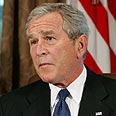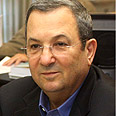

Israel to present Bush with 'Iran file'
Political-diplomatic forum at Prime Minister's Office convenes for special discussion ahead of US president's visit to Jerusalem this week. Defense Minister Ehud Barak to brief Bush on Israeli interpretation to intelligence information on Tehran's nuclear program
The forum convened Sunday afternoon in order to decide on Israel's stance on the Iranian issue ahead of US President George W. Bush's visit to Israel, which is scheduled to being Wednesday.
The Mossad and the IDF Intelligence branch briefed the forum on the information obtained by Israel on the Iranian nuclear issue.
A report submitted to President Bush by the 16 US intelligence agencies (National Intelligence Estimate) following the Annapolis peace conference in November concluded that Tehran had stopped developing a nuclear bomb in 2003.
According to the report, however, Iran continues to enrich uranium despite Russia's willingness to provide the Islamic republic with nuclear fuel aimed at satisfying its needs for civil nuclear energy.
The secret discussion at the Prime Minister's Office was aimed at examining whether Israel had different evidence than the Americans. During the discussion it was made clear that more than 90% of the intelligence information possessed by Israel was identical to the information presented to the American president.
Nonetheless, the additional information does not confirm that Tehran resumed its secret activity to create military nuclear capabilities after 2003. Although the Israeli information points to suspicions that this is in fact Iran's intention, its does not contain enough evidence which will allow Bush to return to Washington with information which will lead to firm action by the international community.
Bush: Iran remains a dangerous country
The discussion held Sunday was the first of its kind held after the submission of the US intelligence report, which led to a withdrawal in the international community's stance ahead of the possibility of imposing diplomatic or military sanctions against Iran.The meeting attendees agreed that Defense Minister Barak will brief the US president on the Iranian nuclear issue during dinner at Prime Minister Olmert's residence on Thursday evening, after Bush returns from a visit to the Palestinian Authority.
The US president recently said that Iran remained a dangerous country. He reiterated his unequivocal demand that Tehran halt its uranium enrichment process. Despite the US intelligence report, Bush insists that both the UN Security Council and corporations and private companies impose sanctions on Iran.
Asked by Yedioth Ahronoth reporters whether his country planned a military strike in Iran, the president replied that at this stage the Iranian nuclear threat should be dealt with through diplomatic measures.
Diplomatic officials estimated that Bush's policy would remain unchanged after the Israelis present him with the "Iranian nuclear file". They said, however, that the US president's visit to Israel would strengthen his stance that the world must act firmly against Tehran.
Meanwhile, Prime Minister Ehud Olmert and Palestinian President Mahmoud Abbas are scheduled to meet Tuesday in order to coordinate their position prior to Bush's visit.
Foreign Minister Tzipi Livni and head of the Palestinian negotiating team, Ahmed Qureia and their teams are scheduled to meet Monday to discuss the core issues.
Olmert and Abbas are expected to sanction the framework devised by Livni and Qureia, which calls for three types of negotiating meetings: Olmert and Abbas' biweekly meeting, Livni and Qureia teams' meetings and designated teams' meetings.















